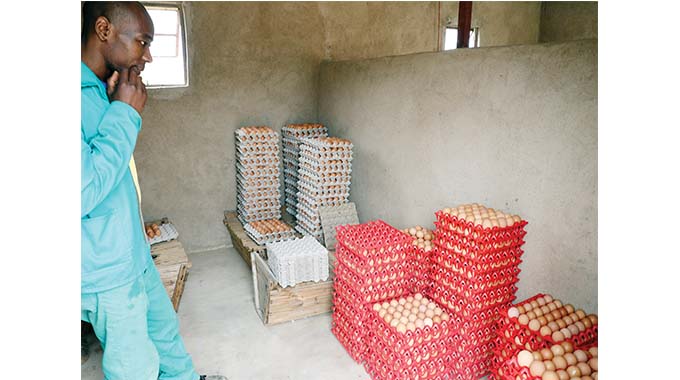Exchange distortion strains formal poultry sales
THE Zimbabwe Poultry Association (ZPA) says the domestic wholesaler-retailer distribution channel is facing stiff challenges emanating from rising inflation linked to prevailing exchange rate distortions and partial dollarisation resulting in more egg stock being held in the market.
The country has two subsectors of the table egg production – large and small-scale producers – that are unique in their structure, conduct and performance.
While the Government has adopted a dual currency system that uses the local dollar alongside forex, the sector says its members are facing different marketing challenges and opportunities for growth.
In emailed responses to Business Chronicle, the association said large-scale commercial table eggs production companies have their own commercial brands of table eggs that are primarily sold through major supermarket chains targeting the medium density and low-density high-income consumers.
However, sales from supermarkets are now relatively low when compared to the informal markets, it said.
“The high-income consumer segment is small in number but big in terms of monthly household consumption of table eggs buying their table eggs in crates of 30 and estimated to consume as many as 140 to 156 eggs per family member per year,” said the
association.
“Traditionally, these wealthy consumers have been buying their favorite brands of table eggs from their favourite neighbourhood supermarkets, which had a wholesale credit facility from major table eggs producing companies, which made supermarkets the cheapest source of eggs for consumers.”
However, since last year, the association said this credit facility arrangement has been removed thereby affecting the lucrative business relationship that existed between established supermarkets and major producer-cum-wholesaler table egg producing companies.
Supermarket
“The 30 to 60 day wholesale credit facility, which has been the hallmark of the wholesale distribution industry no longer makes any business sense to producer/wholesaler companies because of high inflation and negative real interest rate on short term loans working against credit-providers,” it said.
Under the multicurrency policy of partial dollarisation, the association said supermarkets’ price for a crate of 30 table eggs is ZW$1 899,99 payable to wholesalers in 30 days.
However, informal table egg traders dotted outside several supermarkets buy eggs from producers or wholesalers in cash in foreign currency and sell the same crate for US$3,50 per crate at the open market outside the supermarket, it added.
“The disadvantaged formal supermarkets are losing market share to the informal pavement economy offering better deals for consumers and better terms for commercial producers of consumer goods including mealie-meal, cooking oil, soft drinks, and table eggs.
“It is not surprising at all, therefore, that 2022 Q1 interim results from Zimbabwe poultry industry show an uncharacteristically high levels of stocks build-up from major tableegg producing companies trying their best to adjust to the diminishing supermarket sales with informal sector dollarisation and persistent divergence between official exchange rate and parallel market exchange rate,” added the association.
It said the sustained growth in demand for table eggs for the remainder of the year is projected to be anchored in sales through the informal trading sector.
Both large-scale commercial table egg-producing companies and small-scale commercial table egg producers are said to have the capacity to increase production in response to increased domestic demand.
“The demand for day-old chicks was fairly firm in 2022 Q1 and is expected to further
strengthen in Q2, especially in the smallholder poultry production sector serving local
informal markets,” it said.
Meanwhile, the association said the year-on-year growth in production of broiler meat
and table eggs was up by 22 percent and 35 percent, indicating that purchasing power of
consumers remained fairly strong in the first quarter of this year as compared to the
same period in 2021.
“Wholesalers of broiler meat are holding more stocks of broiler meat than in the same
period 2021. Stocks are 10 percent up in Quarter 1 of 2022 against Quarter 1 of 2021,” said
the association.
“Wholesalers of table eggs are holding more stocks of table eggs this Quarter 1 of 2022
than the same period of 2021. Table eggs stocks are up in Quarter 1 of 2022 by 71 percent
against Quarter1 of 2021.”-The Chronicle










